 Title: The German Girl
Title: The German Girl
Author: Armando Lucas Correa (translated by Nick Caistor)
Genre: Fiction (historical)
Release date: 1st December, 2016
Rating: ★★★★
“Before everything changed, Hannah Rosenthal lived a charmed life. But now the streets of Berlin are draped in swastikas and Hannah is no longer welcome in the places she once considered home.
A glimmer of hope appears in the shape of the St Louis, a transatlantic liner that promises Jews safe passage to Cuba. The Rosenthals sell everything to fund visas and tickets. At first the liner feels like luxury, but as they travel the circumstances of war change, and it soon becomes their prison.
Seven decades later in New York, on her twelfth birthday Anna Rosen receives a package from Hannah, the great-aunt she never met but who raised her deceased father. Anna and her mother immediately travel to Cuba to meet this elderly relative, and for the first time Hannah tells them the untold story of her voyage on the St Louis.”
(Simon & Schuster)
First, here’s a couple of reasons you should read this:
- With the current US President’s recent actions regarding immigrants and refugees, The German Girl is super relevant. It’s a timely reminder of what happens when people are turned away.
- The book is based on the true events surrounding the St. Louis, events that I don’t recall ever learning about it in my Modern History class in high school, but growing up in Australia maybe it wasn’t deemed ‘relevant’ to us. I’ve never read about it any of the WWII related books I’ve ever read, so I suspect that there’s a large amount of shame from some quarters, as there should be; or maybe there’s loads of people who just don’t know about it to write about it (the author, Armando Lucas Correa, was one of these people himself). Anyway, you should read The German Girl to learn about a dark but important piece of history.
The German Girl is a fictionalised retelling surrounding the true events of the St Louis, a ship that carried Jewish refugees from Europe to Cuba before the outbreak of WWII. I feel like I should give a quick rundown of what happened to the St. Louis, but it might be a bit spoilery for the book if, like me, you know nothing at all about it. So if you want to know more about it, I’d highly recommend going here and reading all about the voyage of the St. Louis.
Armando Lucas Correa uses the lives of two 11-year-old girls to tell the story: Hannah, who we follow from 1939 Berlin, through to her time on board the St. Louis, and then in Havana; and Anna living in New York in 2014, who eventually ends up in Havana also. The narrative alternates between the two throughout the entire book; and while the back and forth between past and present has irritated me in the past, particularly in regards to those books that could be classed as romantic historical fiction – it just feels like it’s been done to death. But it didn’t feel tedious in The German Girl, and it wasn’t used to point out parallels between two characters that are separated by decades or centuries – there are parallels certainly, but it didn’t seem like the point of the narrative structure was to point them out. It was just two stories, running side by side and eventually meeting.
Correa has worked as a journalist for more than 30 years, so the detail in the novel is incredible and really supports the fictional characters. The contrast between the grey feeling of Berlin and the heat of Havana was lovely to read, while the scenes on board the St Louis had a sense of hopeful unreality about them.I had some issues with the translation as there were a couple of places here and there where the Spanish to English maybe wasn’t done as well as it could have been. It didn’t mean that I missed out on anything plot-wise, but these moments were a little bit jarring and pulled me away from what is otherwise a beautifully written book. I especially appreciated the author’s note at the end, in which Correa writes about the journey of the St. Louis, and includes the passenger manifest along with some photographs of the passengers.
It was difficult not to be affected by the things that happen to the characters in The German Girl – especially to Hannah and her family. It’s been a while since I cried so much at the end of a book, so maybe don’t read the final chapters in public like I did (or at least make sure you have tissues). Be prepared for a book that isn’t an easy ride, but that you’ll be glad to have read in the end.

 I read this one pretty early in the year and all but devoured it in the space of a weekend – I probably should have reread it though because I flew through it so quickly that I didn’t give myself enough time to let it sink in so I could write a proper review of it,
I read this one pretty early in the year and all but devoured it in the space of a weekend – I probably should have reread it though because I flew through it so quickly that I didn’t give myself enough time to let it sink in so I could write a proper review of it,  This is the second of three books by female Aussie writers on this list (the first being The Dry), which I’m really happy about – and all of them are debut novels. I was immediately drawn to this book by the cover, which isn’t always a good thing – there’s even a saying about books and covers – but I wasn’t let down in this case. A solid piece of historical fiction based on the real life of artist Elizabeth Gould, The Birdman’s Wife has done amazingly well in Australia, and I’m pretty sure it entered its second printing in the last couple of weeks, which I think is pretty great since it was only just released at the start of October (but I’m no expert on these things). Also,
This is the second of three books by female Aussie writers on this list (the first being The Dry), which I’m really happy about – and all of them are debut novels. I was immediately drawn to this book by the cover, which isn’t always a good thing – there’s even a saying about books and covers – but I wasn’t let down in this case. A solid piece of historical fiction based on the real life of artist Elizabeth Gould, The Birdman’s Wife has done amazingly well in Australia, and I’m pretty sure it entered its second printing in the last couple of weeks, which I think is pretty great since it was only just released at the start of October (but I’m no expert on these things). Also,  I’ve spent most of November doing a reread of the first five books in the ‘Peter Grant’ series by Ben Aaronovitch and I’ve had such a great time reliving the adventures of PC Peter Grant, his boss, Detective Chief Inspector Thomas Nightingale (who I’m a bit in love with), and all the various beings of the demi-monde they interact with. The publication of The Hanging Tree has been pushed back several times, so when it was finally available I was so excited I could have burst. The book more than delivered, particularly in the final chapters when my heart was beating so hard and so fast I thought it’d leap out of my chest. It was all very intense. So many things happened, so many questions were answered, more questions were raised, and even better – the book had an open ending which means THERE’LL BE ANOTHER ONE.
I’ve spent most of November doing a reread of the first five books in the ‘Peter Grant’ series by Ben Aaronovitch and I’ve had such a great time reliving the adventures of PC Peter Grant, his boss, Detective Chief Inspector Thomas Nightingale (who I’m a bit in love with), and all the various beings of the demi-monde they interact with. The publication of The Hanging Tree has been pushed back several times, so when it was finally available I was so excited I could have burst. The book more than delivered, particularly in the final chapters when my heart was beating so hard and so fast I thought it’d leap out of my chest. It was all very intense. So many things happened, so many questions were answered, more questions were raised, and even better – the book had an open ending which means THERE’LL BE ANOTHER ONE. Just like The Hanging Tree, this is another delayed installment in a fantastic series. Fans of Cronin’s ‘The Passage’ trilogy had been waiting for this third and final book since 2012 when the second book was released. So it’s been a long wait filled with false starts. Was it worth waiting four years? Absolutely. The City of Mirrors was probably the perfect way to end everything. I have so many feelings about this book that I can’t even articulate them properly – but it did break my heart several times over and I’d recommend having some tissues at hand from page 462 onwards because TEARS. And you should absolutely read all three of these books back to back so you can fully appreciate how amazing the characters are (you’ll also become incredibly attached to them which will add to the TEARS). [
Just like The Hanging Tree, this is another delayed installment in a fantastic series. Fans of Cronin’s ‘The Passage’ trilogy had been waiting for this third and final book since 2012 when the second book was released. So it’s been a long wait filled with false starts. Was it worth waiting four years? Absolutely. The City of Mirrors was probably the perfect way to end everything. I have so many feelings about this book that I can’t even articulate them properly – but it did break my heart several times over and I’d recommend having some tissues at hand from page 462 onwards because TEARS. And you should absolutely read all three of these books back to back so you can fully appreciate how amazing the characters are (you’ll also become incredibly attached to them which will add to the TEARS). [ I’m pretty sure this was first released late last year in the US, but it wasn’t published here in Australia until about January this year, so I’m counting it. This might have been the surprise book of the year for me. I thought I’d enjoy it, but I didn’t think I’d enjoy it as much as I did. It was smart, mysterious, weird, creepy, original, and most of the time I had no idea where the long road in the book was taking me. But it was the end of that long road that has stuck with me and put this book in my top ten – it was unexpected and put everything else that came before it in a completely different light. It was final, but also not. I don’t know. If you like weird stuff (or just generally excellent books) and haven’t read this yet then you should go rectify that problem. [
I’m pretty sure this was first released late last year in the US, but it wasn’t published here in Australia until about January this year, so I’m counting it. This might have been the surprise book of the year for me. I thought I’d enjoy it, but I didn’t think I’d enjoy it as much as I did. It was smart, mysterious, weird, creepy, original, and most of the time I had no idea where the long road in the book was taking me. But it was the end of that long road that has stuck with me and put this book in my top ten – it was unexpected and put everything else that came before it in a completely different light. It was final, but also not. I don’t know. If you like weird stuff (or just generally excellent books) and haven’t read this yet then you should go rectify that problem. [ Ok. I knew I’d like this one because LOADS of readers who I’D TRUST WITH MY LIFE (or at least my reading life) absolutely loved it. I listened to the audiobook on Audible, so I’d be 100% ok with receiving this as a gift if anyone feels so inclined, because I know it’s a book I’ll read again and again. Having said that, the audio was amazing and I think that even people who aren’t fans of audiobooks will have no problems listening to this one because it’s the most perfect combination of story and narrator you could possibly get. The ending of The Mothers left me wanting more, not because the ending wasn’t right, but because it felt so real and don’t we always want more from reality? I’m excited to read more from Brit Bennett (or listen if it’s narrated by Adenrele Ojo). [
Ok. I knew I’d like this one because LOADS of readers who I’D TRUST WITH MY LIFE (or at least my reading life) absolutely loved it. I listened to the audiobook on Audible, so I’d be 100% ok with receiving this as a gift if anyone feels so inclined, because I know it’s a book I’ll read again and again. Having said that, the audio was amazing and I think that even people who aren’t fans of audiobooks will have no problems listening to this one because it’s the most perfect combination of story and narrator you could possibly get. The ending of The Mothers left me wanting more, not because the ending wasn’t right, but because it felt so real and don’t we always want more from reality? I’m excited to read more from Brit Bennett (or listen if it’s narrated by Adenrele Ojo). [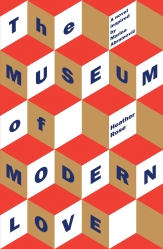 This is third of the three books by female Aussie authors on my list this year. I don’t have any more words for this book so I’m just going to copy and paste from my review: “I can’t really pinpoint why I loved The Museum of Modern Love so much. I don’t think it’s a novel that has any one thing that stands out above everything else; all the individual parts just fit together so beautifully to make a novel that’s both thoughtful and moving, without being over the top. It didn’t leave me elated and it didn’t leave me curled up in bed weeping. But I hugged it when I finished because it gave me that feeling – the one we readers sometimes feel at the conclusion of a book, but can’t quite put into words. It’s about so many things: relationships, life, and art; but it’s also about how these things work together.” [
This is third of the three books by female Aussie authors on my list this year. I don’t have any more words for this book so I’m just going to copy and paste from my review: “I can’t really pinpoint why I loved The Museum of Modern Love so much. I don’t think it’s a novel that has any one thing that stands out above everything else; all the individual parts just fit together so beautifully to make a novel that’s both thoughtful and moving, without being over the top. It didn’t leave me elated and it didn’t leave me curled up in bed weeping. But I hugged it when I finished because it gave me that feeling – the one we readers sometimes feel at the conclusion of a book, but can’t quite put into words. It’s about so many things: relationships, life, and art; but it’s also about how these things work together.” [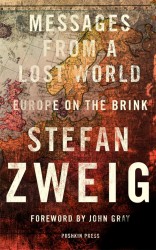 This book has sat quietly at the back of my mind since February being a quiet achiever and the book on this list I’d most like to thrust into the hands of everyone I meet. Zweig witnessed two of the most horrible events of human history – WWI and WWII – and it’s these events that are largely the focus of these essays, but there are also some lovely ones about art and history that were definitely the highlights for me. The essays were written in the period between 1914 and 1941 – many of them originally given as speeches at various events – and this year Pushkin Press published them in English for the first time (a little loophole to get the book on my list). Despite some of the essays being over a century old, this collection could have been written a year ago. They could have been written today. They are as relevant now as they were then and in them you can see Zweig’s devastation at what the world was doing to itself. But. He also offers hope. I’ve said before that no one writes human nature like Zweig does, and I will stand by that assertion until the day I die. He doesn’t necessarily present solutions in Messages from a Lost World , but he does go a little way in helping us make sense of things that don’t make sense. [
This book has sat quietly at the back of my mind since February being a quiet achiever and the book on this list I’d most like to thrust into the hands of everyone I meet. Zweig witnessed two of the most horrible events of human history – WWI and WWII – and it’s these events that are largely the focus of these essays, but there are also some lovely ones about art and history that were definitely the highlights for me. The essays were written in the period between 1914 and 1941 – many of them originally given as speeches at various events – and this year Pushkin Press published them in English for the first time (a little loophole to get the book on my list). Despite some of the essays being over a century old, this collection could have been written a year ago. They could have been written today. They are as relevant now as they were then and in them you can see Zweig’s devastation at what the world was doing to itself. But. He also offers hope. I’ve said before that no one writes human nature like Zweig does, and I will stand by that assertion until the day I die. He doesn’t necessarily present solutions in Messages from a Lost World , but he does go a little way in helping us make sense of things that don’t make sense. [ This book is wow. I received an ARC of it from NetGalley all the way back in the latter part of 2015 (and then purchased a lovely hardcover of it when it was released in February), read it in November of that same year, and ever since then it had been sitting in the number one position for this list, all the way up until October of this year. So for nearly twelve whole months, nothing came close to matching my opinion of this book. The North Water is as dark, gritty, and gory a historical fiction as you can get and I unashamedly love it. On this list it stands out as my “definitely not for everyone” book. It’s super graphic in parts and I know it will make even those with the strongest stomachs a little uncomfortable. It’s setting is largely in the Arctic, giving it a bleakness that almost amplifies the moments of violence – it’s really quite horrifying. It’s also a lesson in sharp writing and editing as it packs a hell of a punch in just 270 pages (or 336 depending on which edition you read). I loved it, many people will hate it, but it’s a great book nonetheless. [
This book is wow. I received an ARC of it from NetGalley all the way back in the latter part of 2015 (and then purchased a lovely hardcover of it when it was released in February), read it in November of that same year, and ever since then it had been sitting in the number one position for this list, all the way up until October of this year. So for nearly twelve whole months, nothing came close to matching my opinion of this book. The North Water is as dark, gritty, and gory a historical fiction as you can get and I unashamedly love it. On this list it stands out as my “definitely not for everyone” book. It’s super graphic in parts and I know it will make even those with the strongest stomachs a little uncomfortable. It’s setting is largely in the Arctic, giving it a bleakness that almost amplifies the moments of violence – it’s really quite horrifying. It’s also a lesson in sharp writing and editing as it packs a hell of a punch in just 270 pages (or 336 depending on which edition you read). I loved it, many people will hate it, but it’s a great book nonetheless. [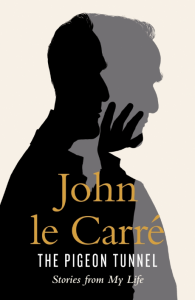 If you’ve been reading this blog for a significant amount of time you’ll know that Mr le Carré is my
If you’ve been reading this blog for a significant amount of time you’ll know that Mr le Carré is my 
 The Little Book of Hygge: The Danish Way to Live Well by Meik Wiking.
The Little Book of Hygge: The Danish Way to Live Well by Meik Wiking.  The Voynich Manuscript edited by Raymond Clemens.
The Voynich Manuscript edited by Raymond Clemens. 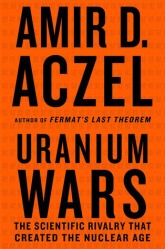 Uranium Wars: The Scientific Rivalry that Created the Nuclear Age by Amir D. Aczel
Uranium Wars: The Scientific Rivalry that Created the Nuclear Age by Amir D. Aczel  Les Misérables by Victor Hugo
Les Misérables by Victor Hugo  Who Is to Blame? A Russian Riddle by Jane Marlow
Who Is to Blame? A Russian Riddle by Jane Marlow 
 Title: Wayward Heroes
Title: Wayward Heroes
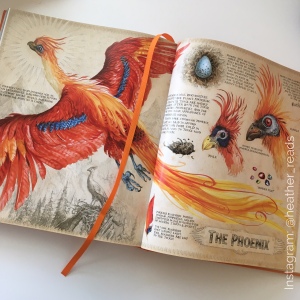


 The Traitor Baru Cormorant
The Traitor Baru Cormorant
 Title: The Mystery of the Three Orchids (Commissario De Vincenzi #12)
Title: The Mystery of the Three Orchids (Commissario De Vincenzi #12)